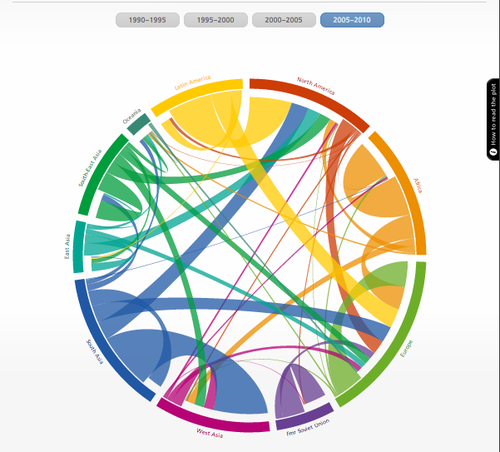
[Image credit: an amazing visualisation on migration flows, on http://global-migration.info]
In a couple of weeks, my brother is getting married. This is a hugely exciting event in my family, and family members are coming from all around the world to attend the wedding(s) – they're having the actual wedding in Devon, and then a 'reception' up where my parents live, in Manchester.
Party details aside, I don't think I'll have ever seen so many of my family members gathering in one place before; though we still have lots of family in Bangladesh, we've all travelled a lot. It's made me think a lot about the various cultures that are encompassed within our extended family – within just a couple of generations, we've put roots down all across the world, and that has brought with it some interesting changes in cultural values among us.
My parents came over from Bangladesh to the UK when they were in the early 20s, and they've now lived longer in the UK than they ever were in Bangladesh. Yet despite their British passports, they still refer to themselves as Bangladeshi, mostly. They've retained much of their Bangla culture, but with a heavily British twist, and I consider myself incredibly lucky to have experienced the mixture – they were pretty liberal with me, and I grew up not noticing too much of a difference between myself, and my friends with British parents.
Of course, there were some differences; we ate Bangladeshi cuisine at home, my mum would wear beautiful saris to go to parties, I received presents not only on Christmas, but on both Eids as well, there was never any alcohol in the house, for example. But, there were never any restrictions on, for example, what I wore, or who I made friends with, spending time with my friends, where I travelled to alone, or being able to choose when and what I studied or now work in. I've discovered that only now am I realising the benefits of that bicultural upbringing – whether that's because I'm getting older, or because I'm now living in Germany, I don't know.
But here in Germany, when people ask me where I'm from, I say, “the UK”. I grew up there, I lived my whole life there until I was 19; my values are rooted in British values, my close friends from my childhood are British, my cultural references are based upon British TV and pop culture, and my education was through a British lens. The differences in my upbringing to that of my friends seems somewhat minor in comparison to the strength of those things, but still, as I've written about many times before, here in Germany I'm referred to often by my Bangladeshi heritage, and treated somewhat differently as a result.
Conversely, when I go to Dhaka, I'm often referred to as “the English cousin”. Likewise with cousins, whose parents (of my parents generation) moved abroad as adults – I have cousins who I consider to be from Australia, from Canada, from the US, from Italy. And in fact, I'd estimate that all of us have closer ties to those countries than to the one that connects us all.
One aspect of this country- and culture-swapping is the language changes; my first language is very strongly English, which is my parents' second language. But my niece and nephew's first language is French; a language that my parents don't even speak, and their second language (though, very close to their first in terms of learning) – is English. Within the three generations, we have three different mother tongues.
While it has some very minor issues in terms of communication, the cultural differences this brings are greater; I'm a huge advocate of cultures and languages being very closely intertwined (perhaps because of the various mixes within my family!), and I'm noticing these differences more and more when we spend time together.
Within the extended family too, these differences in upbringing and in countries mean that we all subscribe to slightly varying cultural values. I know that within any family, the generational differences will lead to cultural differences too, but I'd hazard a guess that having both a generational gap as well as a cultural one brings up perhaps more pronounced differences.
Of course, this is sometimes difficult to reconcile – but more importantly, isn't this kind of wonderful? It's taken just 40 years for my family to go from (as far as I know) unilaterally Bangladeshi, speaking Bengali, and living in Bangladesh, to this variety of cultures, languages and countries. We've changed so much from our shared ancestors in Bangladesh, and yet we've retained enough of our shared heritage to still have those close family connections.
And, somewhat obviously, we've been able to become this rich mixture through immigration – my parents to Bangladesh, me to Germany, my cousins to the US, my brother to Switzerland, my uncle to Italy, my cousin to Hungary, my auntie to Australia... the list goes on. All too often (sadly, increasingly in the UK) the framing around immigration is so narrow minded and focused on money – how much money immigration costs taxpayers of rich countries, how much money is sent back from immigrants to poorer countries... and we forget the rich, cultural benefits that it brings to individuals and to wider society as a whole.
As a family, we're far more likely to be tolerant of people from other cultures, because we, ourselves, as a family, ARE from other cultures. If there's one thing that the world needs more of, it's tolerance; it seems to me like immigration is a great way to get there.